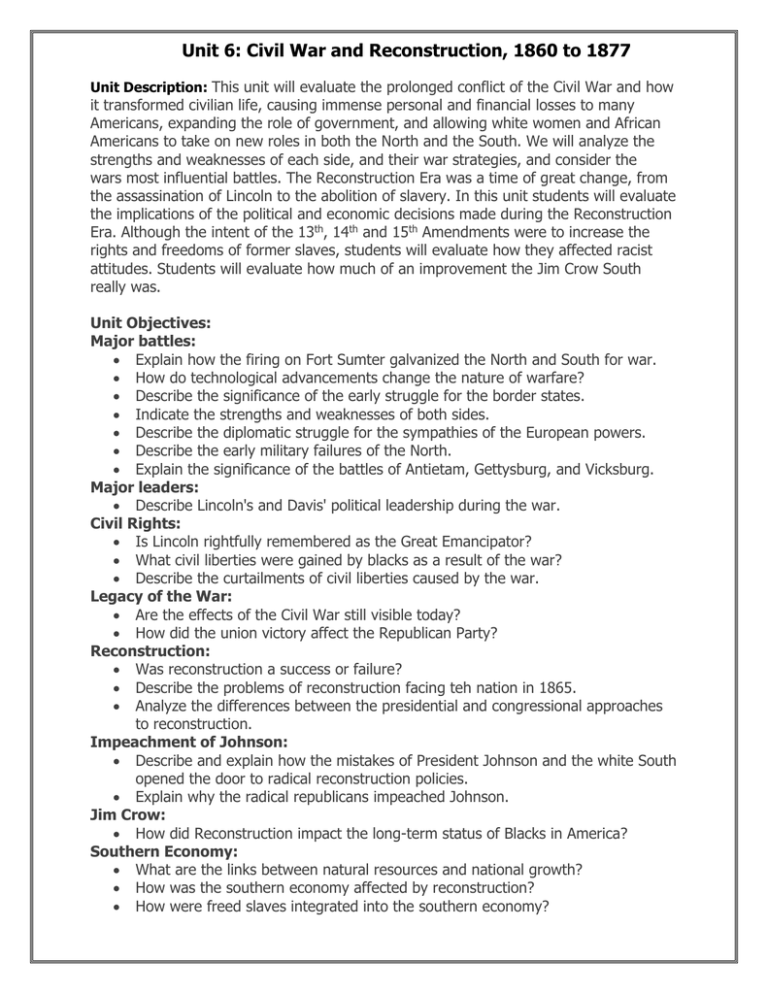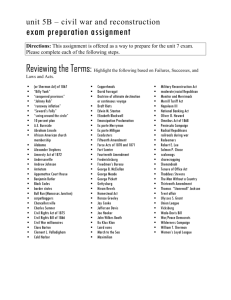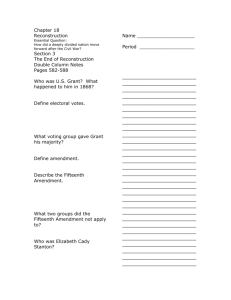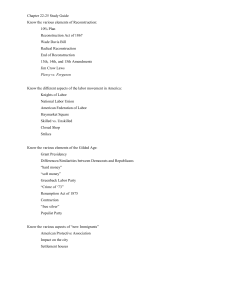Unit 6 Outline
advertisement

Unit 6: Civil War and Reconstruction, 1860 to 1877 Unit Description: This unit will evaluate the prolonged conflict of the Civil War and how it transformed civilian life, causing immense personal and financial losses to many Americans, expanding the role of government, and allowing white women and African Americans to take on new roles in both the North and the South. We will analyze the strengths and weaknesses of each side, and their war strategies, and consider the wars most influential battles. The Reconstruction Era was a time of great change, from the assassination of Lincoln to the abolition of slavery. In this unit students will evaluate the implications of the political and economic decisions made during the Reconstruction Era. Although the intent of the 13th, 14th and 15th Amendments were to increase the rights and freedoms of former slaves, students will evaluate how they affected racist attitudes. Students will evaluate how much of an improvement the Jim Crow South really was. Unit Objectives: Major battles: Explain how the firing on Fort Sumter galvanized the North and South for war. How do technological advancements change the nature of warfare? Describe the significance of the early struggle for the border states. Indicate the strengths and weaknesses of both sides. Describe the diplomatic struggle for the sympathies of the European powers. Describe the early military failures of the North. Explain the significance of the battles of Antietam, Gettysburg, and Vicksburg. Major leaders: Describe Lincoln's and Davis' political leadership during the war. Civil Rights: Is Lincoln rightfully remembered as the Great Emancipator? What civil liberties were gained by blacks as a result of the war? Describe the curtailments of civil liberties caused by the war. Legacy of the War: Are the effects of the Civil War still visible today? How did the union victory affect the Republican Party? Reconstruction: Was reconstruction a success or failure? Describe the problems of reconstruction facing teh nation in 1865. Analyze the differences between the presidential and congressional approaches to reconstruction. Impeachment of Johnson: Describe and explain how the mistakes of President Johnson and the white South opened the door to radical reconstruction policies. Explain why the radical republicans impeached Johnson. Jim Crow: How did Reconstruction impact the long-term status of Blacks in America? Southern Economy: What are the links between natural resources and national growth? How was the southern economy affected by reconstruction? How were freed slaves integrated into the southern economy? Key Terms: Make flash cards identifying the key terms. They are due on the day of the unit exam and count as a quiz grade. Chapter 11 1. Anaconda Plan 4. George McClellan 7. Shiloh 10. dissident 13. William Tecumseh Sherman 16. Gettysburg Address 19. John Wilkes Booth 2. Stonewall Jackson 5. Ulysses S. Grant 8. USS Monitor 11. conscription 14. Vicksburg 3. Robert E. Lee 6. unconditional surrender 9. Emancipation Proclamation 12. Clara Barton 15. Gettysburg 17. 13th Amendment 20. National Bank Act 18. Ford’s Theater 21. Red Cross 2. Reconstruction 5. Wade-Davis Bill 8. 14th Amendment 11. 10 % Plan 14. sharecropping 17. Panic of 1873 20. Slaughterhouse Cases 3. Radical Republicans 6. Freedmen’s Bureau 9. 15th Amendment 12. scalawag 15. tenant farming 18. redemption 21. home rule Chapter 12 1. Andrew Johnson 4. Thaddeus Stevens 7. black codes 10. impeach 13. carpetbagger 16. Ku Klux Klan 19. Rutherford B. Hayes Essay Topics: 1. Theme: Change — Constitutional Amendments When the Founding Fathers wrote the United States Constitution, they included the amendment process. The amendments that have been passed brought political, social, and economic changes to American society. Task: Select two constitutional amendments that have changed American society and for each • Describe the historical circumstances that led to the adoption of the amendment • Discuss the political, social, and/or economic changes the amendment brought to American society 2. Theme: Presidential Actions United States presidents have taken actions that have had a significant effect on United States foreign or domestic policies. Task: Identify two presidential actions that have had significant effects on United States history and for each • Describe the historical circumstances surrounding the action • Discuss the impact of the presidential action on United States foreign policy or on American society 3. Theme: Technology Technological developments have had both positive and negative effects on the United States economy and on American society. Task: Identify two different technological developments and for each • Discuss the positive and/or negative effects of the technological development on the United States economy or on American society




